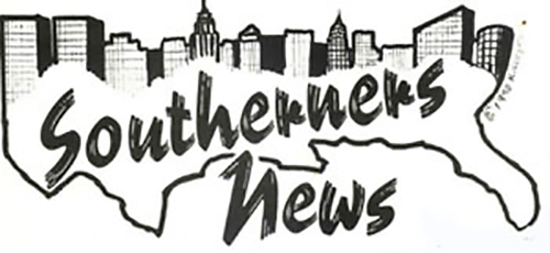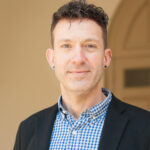Jay Watkins III
When Dave Gilbert graduated from William & Mary in May 1983 he faced a problem he imagined many queer Southerners faced: stay close to home, family, and tradition or abandon the region to live an openly gay life. Gilbert and his lover arrived in New York that October. When he died from AIDS-related complications in 1992, his papers, and those of the organization he founded, Southerners, went to New York’s LGBT Center Archives.

The Southerners collection opens a window onto extended kinship networks and self-described “surrogate family” in the queer Southern diaspora. The notes, letters, newsletters, photos, and interviews in the four archive boxes reveal a range of desires that brought people to Southerners. Some came in search of “something familiar in a culture starkly different.” For example, Gilbert told the New York Native in December 1990 that “new arrivals from the South appreciate Southerners being able to provide advice and to connect them with others who have already made the difficult transition (frequently from small towns in the South) to urban Manhattan.” Others reached out from afar. One particularly touching letter in the collection was sent to “CUNY lesbian and gay people” by a young man imprisoned in North Florida for sodomy who wanted pen pals in advance of a planned migration to New York. Some people came to the semi-regular potluck suppers to “exorcise” and “work through bitter memories” over plates of cobbler, fried okra, or black-eyed peas.
Alumni networks were especially integral to Southerners’ work, their Southernness, and their extended kinship networks. For the “Fall Southern GALA” (Gay and Lesbian Alumni Associations) party volunteers decorated the LGBT Center’s lobby with balloons, the Southerners’ banner, and their origins map. Meredith Ann Jackson told newsletter readers that “The South not only has risen again, but it is singing” as Richard Barrios’ piano filled the halls with show tunes and “South-Inspired” music. Amidst Southern music, food, and a heavy dose of nostalgia, these Southern alumni conjured a little piece of the South in Manhattan, albeit a primarily white, homogenous, nostalgia-driven, and pastiche “Southerness.”
Beyond helping “refugees” (Gilbert’s word), Southerners’ material urged prospective members and donors to “help us make the South a better place for gay people to live.” Unlike other organizations that acted the part of enlightened saviors coming to the rescue, Southerners asked locals working on the ground what they needed and found ways to support that. Across the group’s three years, they held fundraisers for causes as diverse as defeating North Carolina homophobe Senator Jesse Helms and building a community center in Dallas.
Almost a decade before scholars like John Howard argued against the bi-coastal bias of queer scholarship that constructed the South as monolithically hostile to gender and sexual difference, the Southerners collection shows us a well-established network of Southern queers. The Southerners collection gives us insight into a group of people who wanted to stand in the middle, resist assimilation, and help those continuing to work in the South: not as urban saviors but as an extended kinship network.
 Jay Watkins is a Lecturer in the History Department at William & Mary. He received his PhD in American Studies from King’s College London in 2013. He is a historian of the queer South whose book Queering the Redneck Riviera: Sexuality and the Rise of Florida Tourism was published in 2018. His current research focuses on queer theatre in, of, or about the U.S. South with particular interest in AIDS theatre. He teaches courses across the modern U.S curriculum with a particular focus on social justice, sexuality, and culture.
Jay Watkins is a Lecturer in the History Department at William & Mary. He received his PhD in American Studies from King’s College London in 2013. He is a historian of the queer South whose book Queering the Redneck Riviera: Sexuality and the Rise of Florida Tourism was published in 2018. His current research focuses on queer theatre in, of, or about the U.S. South with particular interest in AIDS theatre. He teaches courses across the modern U.S curriculum with a particular focus on social justice, sexuality, and culture.

NOTCHES: (re)marks on the history of sexuality is licensed under a Creative Commons Attribution-NonCommercial-NoDerivatives 4.0 International License.
Based on a work at www.notchesblog.com.
For permission to publish any NOTCHES post in whole or in part please contact the editors at NotchesBlog@gmail.com




